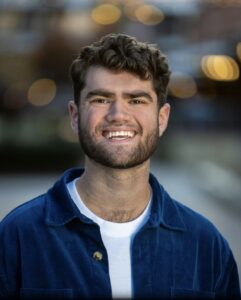If you had called me “Mr. Ethan” three years ago, I would have thought you had mistaken me for someone else. Now, I spend my days reading Curious George, helping with potty training, and pretending to be a monster on the playground with fifteen two-year-olds.
When I originally interviewed to become an early childhood educator for The Little School, I was intrigued by the prospect of pouring my energy into something larger than myself. After years of working in retail and sales, I was ready for a much-needed change. I still remember my first day on the job. Some children were incredibly skeptical of a stranger being on the playground, let alone a male teacher. Others were intrigued and expressed no hesitation when asking me deeply personal questions like “What’s your favorite color?” and “Why do you look scared?”
As the days turned into weeks, I began to build rapport with them. I started to learn things I never thought I would—like the scientific names of dinosaurs and how fast certain cars could go. In exchange for this valuable information, I shared how to put on a jacket by laying it flat on the floor (the “flip trick”) and how to take deep breaths when feeling angry.
It was a rocky start, but as we built mutual trust, I began to see just how important my role was as an early childhood educator. I wasn’t just supervising the children until their grownups came to get them—I realized that I was an integral part of the life skills they were developing.
By teaching the “flip trick,” I was helping facilitate thousands of new neural connections—problem-solving, confidence, independence, and basic gross motor skills. When encouraging a deep breath, I was helping them regulate their emotions and engage in constructive dialogue. I was doing more than helping raise a “good kid;” I was helping raise a human being. To be a part of this process and witness their growth over the last three years is an honor and a privilege reserved for those lucky enough to make the sacrifice.
And I do mean sacrifice.
Though my heart is full because of the experiences I’ve had working with children, it hasn’t come without challenges. Working with children means navigating unpredictable emotions and the exhausting demand of being present every single moment…and catching every sickness imaginable (I recall having lice and a double ear infection simultaneously on one occasion).
Admittedly, there have been times when I considered whether it was worth it to stay in the field. During those moments, I consider what the children provide for me. I have learned to appreciate patience, and I have learned to love what I do, as demanding as it can be.
The truth is, being an early childhood educator is a deeply moving job. One is given the unique opportunity to be shaped by the smallest voices—voices that teach us how to be more human, more patient, and more present than we ever thought possible. Those small voices keep me showing up every time.
I know that early childhood education is a critical job for the health, education, and economy of North Carolina. If there is one takeaway from my three years in the field, it is just how vital these fundamental years are for the child and our society at large. Early childhood isn’t daycare. It’s a long-term investment. North Carolina is not immune to the struggles facing early childhood educators. High turnover, lower wages, and chronic understaffing continue to negatively impact this essential field. Despite evidence that early investment in childcare yields long-term benefits—academically, socially, and economically—centers are often underfunded and fail to adequately support the very professionals making these investments possible.
That’s why I find myself unable to educate without also advocating for the support that our field needs. Support for early childhood means recognizing us as the skilled professionals we are. It means creating bold policy solutions that prioritize children and those who care for them. Most of all, it means making it easier for more young men and women to enter the field—educators who feel empowered, respected, and supported as they pursue a path that brings them true joy.
Now, when I hear “Mr. Ethan,” I turn around and see a child looking back, searching for the trust, love, and care they need as they navigate this world. I see the future—a leader, artist, scientist, teacher, friend. I see the reason I stayed even during the difficult times. I am reminded that when I turn around and show up for the child, I am also showing up for who they will become. And when we all show up for them, we are choosing to invest in a brighter, more compassionate future for us all.
Ethan Wrenn is an early childhood educator based in Mebane, North Carolina. He is passionate about nurturing young minds and creating enriching learning environments for children, working as an educator at The Little School at Duke. Wrenn is married to Kaitlin Moore, a fellow early childhood educator who shares his commitment to child development and learning. In his free time, Wrenn enjoys hiking through North Carolina’s scenic trails.

